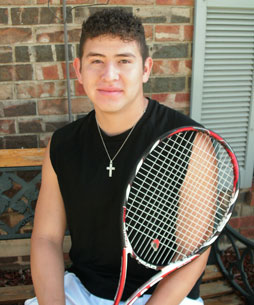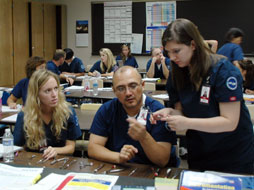By Steve Knight/editor-in-chief
With national and state health officials unsure of when the H1N1 vaccine will be available and how it will be distributed, TCC flu task force officials recommend that students take precautions for the possible onset of H1N1 and seasonal flu.
Pat Marling, NE Campus coordinator of health services, recommended that students purchase a thermometer and monitor their temperature if they experience flu-like symptoms such as cough, sore throat and a fever of 100 degrees or higher.
Those who develop a fever while on campus can have their temperature taken at a campus health center, she said.
“Stay home and isolate yourself,” she said. “We are promoting self-isolation.”
Students should also avoid shopping malls and other public places if they are ill.
Patients with the H1N1 virus have also complained of diarrhea and vomiting, symptoms not associated with seasonal flu, the Texas Department of State Health Services reported.
Health officials recommended students stay home until their temperature stays below 100 degrees for 24 hours without fever-reducing medications.
Pregnant women, infant caregivers, medical workers, people between ages 6 months and 24 years old and chronically ill patients ages 25-64, could be at risk for complications from H1N1 as well as seasonal flu and should monitor their health closely, calling their health care provider if symptoms worsen, Marling said.
Marling said it is unclear how the H1N1 vaccine, currently scheduled for completion in mid-October, will be distributed, but students should contact their primary care provider or drug stores for information regarding seasonal flu shots.
“Information is changing everyday,” she said. “We [the flu task force] are on top of it. We are being proactive and looking at every contingency.”
State health officials recommend taking action to stay healthy, including getting enough sleep, eating well, avoiding stress and staying hydrated, especially water and electrolyte beverages for infants.
“Try to do the healthy things,” she said. “Stack the deck in your favor.”
State health officials also recommend covering the nose and mouth with a tissue when coughing and sneezing, throwing the tissue away after use.
Avoid spreading germs by keeping hands away from the eyes, nose or mouth.
Follow advice from local public health departments as they continue to look at ways to prevent infection.
Officials also recommend storing a supply of food, medications, face masks and alcohol-based hand rubs as a precaution.
The Atlanta-based Centers for Disease Control reported Friday that doctor visits for influenza-like illness are increasing nationally.
Eleven states and Guam reported widespread flu activity, which is unusual in August and September.
Tarrant County health officials said they are continuing to monitor flu activities.
Marling also recommended staying informed on H1N1 from news media and on Internet sites such as Student Health 101, accessible on the TCC Web site from the Health Services page.

























